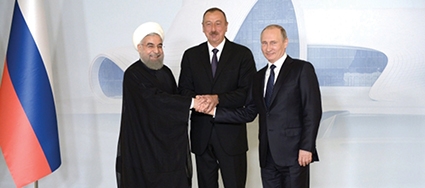New Geopolitical Reality in the South Caucasus & The Georgian Dilemma
This August delivered new geopolitical shifts in the regional security dimension of the South Caucasus and Caspian Basin areas by launching a new geopolitical long-distance race. On 7-8 August, a tripartite summit was held in Baku where Azerbaijan, Iran and Russia focused on regional security arrangements in the South Caucasus, trying to force yet another step towards making progress regarding the Caspian Sea legal status disagreements among the littoral states. The longest talks were given by the leaders of Russia and Iran and very soon the results were at hand.
On the second day of the Summit, Turkey’s President Erdogan paid an official visit to Sankt-Petersburg and entered into more long-standing bilateral negotiations with the President of Russia, whom he now considers as his “best friend.” And somewhat unsurprisingly, all this was followed by another high-level micro-Summit between Iran and Turkey – Erdogan and Rouhani in Tehran to discuss concrete aspects of relations between the nations, as well as regional security issues.
This “tripartite” geopolitics has already endorsed some kind of new paradigm for regional security development in the South Caucasus and has already had a big impact on processes taking place in the Middle East, namely in Syria. It seems that the regional hegemonic actors - Russia, Iran and Turkey are settling on common geopolitical interests, thus trying to harmonize their energy security and pursuing joint efforts to cope with international terrorism. In reality, it also translates into fostering their efforts on South Caucasus regional geopolitics against USA involvement in the region. Despite the fact that Turkey is thought to be a part of the Western community, at least being a Member State of NATO and being granted Associate Membership status-quo since 1963, the incumbent Turkish authority is seeking to downplay its own “selfish great game,” reorienting its geopolitical priorities from West to East, clashing with some EU member-states in the process, for instance, with Germany and Austria.
It is blatantly obvious that Turkey is to an extent reconsidering its relations with the USA due to the results of the failed coup (according to Belgian information agency EurActiv.com, the US started transferring nuclear weapons, around 20 tactical nukes, from Turkey into Romania following the failed coup of July 2016, when Incirlik’s Air Force base power was cut and the Turkish government prohibited US aircraft from flying in or out). More concretely, lately the Turkish Minister of Foreign Affairs even threatened that Turkey could withdraw from NATO if the Alliance did not provide more necessary assistance to his country (according to British newspaper ‘Daily Express’).
A new regional security agenda is evolving: the Moscow-Ankara-Tehran geopolitical axis is not a myth but a reality. What and how the regional powers reached a “geopolitical consensus” on various drastic topics is a real question for international society to ponder. The Baku Summit was a prelude for further strategic partnership between Iran and Russia, stabilizing relations between Azerbaijan and Iran and making positive what is already more than a “warm” political relationship between Azerbaijan and Russia. In short, these are the missions the Baku Summit seems to have accomplished:
Institutionalize a framework for setting up an informal grouping of Iran, Azerbaijan and Russia and seeking to combine their interests toward Caspian Sea legal problems, and pursuing the identification of common interests toward energy security provisions. The next Summit will be held in Tehran and President Hassan Rouhani has proposed to invite all other actors to engage in the regional security discussions;
Promoting the new geo-economic project “North-South” transport-transit corridor for transposing goods and merchandize from China and South East Asia towards Western Europe under the aegis of the “Silk Road” project, worth USD 22 billion and launched by China in 2010. The corridor provides opportunities for involved parties (Iran and Russia) to directly transfer all cargos via their territories to the EU member-nations via the shortest land routes, and for Azerbaijan it gives an opportunity to get the craved status of so-called “Transit Hub” for disseminating cargo in a “North-South” direction meaning Georgia and Armenia are to be ousted from the “Silk Road” program.
Fostering Iran-Russia strategic cooperation on a bilateral basis. The cooperation has transformed into a concrete geostrategic project. Iran and Russia set up a new formal military alliance for the Middle East with the involvement of the Assad regime, Iraq, Iran and Russia against ISIS and the JabhatFatkh-ash-Sham coalition (created lately).
As for the Russian-Turkish relations, after the Sankt-Petersburg bilateral Summit, the parties agreed to promote a common geopolitical agenda, including the construction of gas undersea pipeline “South Stream-2,” capable of delivering more than 60 billion cubic meters of gas to the EU market and to Turkey itself. In addition, the development of another important mega-energy project has been discussed- the construction of a nuclear reactor worth USD 20 billion in the southern part of Turkey.
Moreover, Turkey officially offered its apologies for the Russian jet incident of last year and reached an agreement, including a secret memorandum, on combating terrorism and coordinating joint efforts to fight ISIS. Considering all the above-mentioned, it stands to reason that Georgia is entering a “geopolitical deadlock” and will soon face a serious dilemma at the regional security level. Hence, the situation is grave and only the further development of the Euro-Atlantic foreign policy can help them to escape said “deadlock”.
Dr. Vakhtang Maisaia












